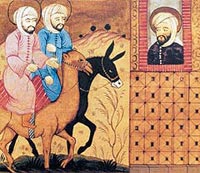the verdict on Islam
As another anniversary of the terrorist attacks on New York City and Washington approaches it can be said no other subject during this period has been discussed as widely as Islam and Muslims.
Salim Mansur: Muslim world not a monolith
9/11 was the first real Internet event ...
Yaakov Kirschen @ Dry Bones
As sep11 approaches as the 6th anniversary of Islam's violent impact on the West, articles are appearing that try to sum up our responses to that event. Salim Mansur, the sanest voice out of the Muslim world, insists that Saudi Arabia and its Wahhabist brand of Islam is "the Muslim world's heart of darkness", protected by the West's dependency on its oil.
There are, however, many voices arising from among Western scholars of Islam that are warning that this heart of darkness is, in fact, the essence of Islam and not some extreme puritanical interpretation. In this, the concept of abrogation is important as it gives precedence to aspects of Islam that developed later in the life and adventures of the founding prophet. Thus the violent and intolerant aspects emphasized in Wahhabism have far greater weight than earlier tolerant aspects as well as later Sufi attempts to spiritualize the notion of jihad from its original imperialistic meaning to that of an inner struggle.
The issue of abrogation in Islam is critical to understanding both jihad and da'wa, the propagation of Islam. Some Muslims may preach tolerance and argue that jihad refers only to an internal, peaceful struggle to better oneself. Western commentators can convince themselves that such teachings are correct. However, for learned Muslim scholars and populist leaders, such notions are or should be risible. They recognize that, in practice, there is compulsion in Islam. They take seriously the notion that the Qur'an teaches not just tolerance among religions, but tolerance among religions on the terms of Islam.
David Bukay: Peace or Jihad? Abrogation in Islam [my emphasis]
As Kirschen observes, the internet has been a major forum for discussing Islam after 9/11 and I have taken part in many of those forums as well as following the arguments of influential (ex-)Muslims like Ibn Warraq (through his book Why I Am Not a Muslim) or Wafa Sultan (through her widely viewed confrontation on Arab television). I have also followed the developing views of non-Muslim writers like Daniel Pipes (of The Middle East Forum) and Robert Spencer (of Jihad Watch). I watch closely the developments in Israel via various Jewish news outlets, with special attention to the writings of journalist Caroline Glick.
In "real life" I have also attended a few "interfaith dialogue" events and courses which attempt to build bridges between the Christian and Islamic faith traditions. The most memorable remark concerned the contrast between Jesus' veneration as victim and Mohammad's veneration as victor. However, understandably enough, these bridge building exercises lacked any well developed opportunities for authentic confrontation. They are never debating platforms but fairly facile "feel good" moments.
I'm a great believer in the idea that nothing worthy of the name "truth" can exist unless it has survived the flames of heated debate and forthright confrontation. As an ancient Chinese sage put it: "True gold fears not the refiner's fire." On that basis, I've come to the conclusion that Islam is, by and large, too fragile to face such intense fire and is therefore pretty valueless on the face of it. However, the Sufi interpretations do have value, especially if they are understood as essentially subversive (which is also how Wahhabism perceives them).
I am particularly partial to the popular Sufi image of Jesus riding on a donkey in company with Mohammad riding on a camel, an example of which is shown below. These two prophets are two sides of the one coin: expressed not only as victim and victor, but as passive and active, as feminine and masculine, as flexible and firm, and many other similar opposites.

In my view, Christianity distilled an essentially one-sided aspect out of the complete original picture that Judaism represents. Islam was needed to fill things out, so really the complete man should be able to imitate both Jesus and Mohammad, both Mansur Al-Hallaj (the Islamic Christ) and Julius Caesar (the archetypal worldly emperor-conqueror of the West). Each needs the other and ultimately fails when it tries to stand alone.
When people talk of Islam as being "a religion of peace", they are trying to reduce it to a mimicry of Christianity which it simply is not. When Israel tries to bend over backward to obey Christian based principles in her approach to her sworn enemies, she leaves herself open to victimhood and exploitation. Israel is badly in need of the forthright warrior spirit boldly expressed in Glick's writings for only a warrior can vanquish an enemy warrior.
It is difficult for Israel and it is difficult for all of us to watch as this dreadful drama is played out. I'm too small a player to do more, really, apart from praying for Israel's longer term safety and for the immediate safety of the children of Sderot who have been deliberately targetted by Qassam rockets from Gaza. I pray also that a new Judaism will develop that will allow its children back into the fold with a new Jerusalem accommodating not only the original monotheism and its Christian and Islamic offshoots but this new integrative theism that will honour all of the children of the Goddess.



0 Comments:
Post a Comment
<< Home